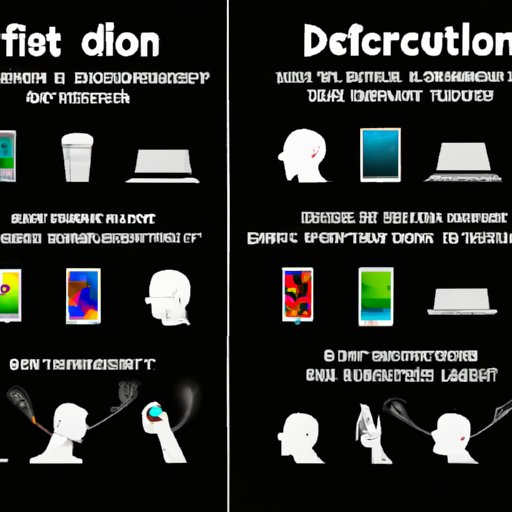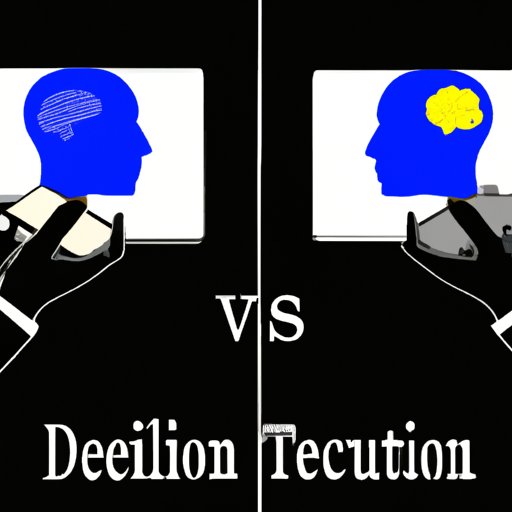Introduction
In today’s digital age, technology plays an integral role in our lives. From smartphones to computers, we are constantly surrounded by technology. But while technology can bring many benefits, it can also have a detrimental effect on our lives if we become too dependent on it. This phenomenon is known as “technology addiction”—a condition where an individual has an unhealthy obsession with technology and its use.
In this article, we will explore the concept of technology addiction and examine its impact on mental health, social interactions, education, and other aspects of life. We will also discuss the pros and cons of technology addiction and investigate how it compares to other addictions. Finally, we will look at ways to overcome technology addiction.

Examining the Impact of Technology Addiction on Mental Health
Technology addiction can have a major impact on our mental health. Studies have shown that excessive technology use can lead to negative emotions such as anger, guilt, and frustration (Hirshfield & Schreiber, 2017). Additionally, research has found that there is a strong correlation between technology addiction and depression, anxiety, and other mood disorders (Bianchi et al., 2016).
One of the main reasons why technology addiction can lead to negative emotions is because of the comparison trap. When we are constantly bombarded with images of people living their “best life” on social media, it can be hard not to compare ourselves to others and feel inadequate (Mannarini, 2019). This can lead to feelings of low self-esteem and depression.
Furthermore, technology addiction can lead to isolation and loneliness. When we spend too much time on our devices, we are less likely to engage in meaningful face-to-face interactions with family and friends. This can lead to feelings of loneliness and disconnection from those around us (Rosen, 2019).

Exploring How Technology is Changing Social Interactions
Technology addiction can also have a major impact on our ability to interact with others. Studies have found that technology is decreasing the amount of time we spend interacting with others face-to-face (Kuo et al., 2018). As a result, our communication skills are suffering as we rely more and more on technology to communicate with one another.
The decrease in face-to-face interactions can also lead to a reduced ability to communicate effectively. When we communicate through technology, we lose the nuances and subtle cues that come with face-to-face conversations. This can make it difficult to really understand what someone is trying to say (Mannarini, 2019).
Finally, technology addiction can lead to a diminished sense of human connection. With technology, we can easily connect with people from all over the world. However, these connections often lack the depth and authenticity of real-life relationships (Rosen, 2019). As a result, we may find that we are unable to truly connect with those around us.
Investigating the Effects of Technology on Education
Technology addiction can also have a major impact on education. Research has found that excessive technology use can lead to a decreased attention span and a loss of critical thinking skills (Kuo et al., 2018). Additionally, studies have shown that students who use a lot of technology are less likely to collaborate with one another (Mannarini, 2019).
The decrease in attention span can make it difficult for students to stay focused and engaged in class. Furthermore, the loss of critical thinking skills can lead to a reliance on technology for problem solving, rather than using their own creativity and ingenuity. And the decreased ability to collaborate can make it difficult for students to work together on projects or assignments.
Analyzing the Pros and Cons of Technology Addiction
When examining technology addiction, it is important to consider both the benefits and drawbacks. On the plus side, technology can provide us with access to information, entertainment, and communication that was previously unavailable. Additionally, technology can make tasks and activities easier and more efficient (Kuo et al., 2018).
However, there are also drawbacks to technology addiction. Excessive technology use can lead to a decrease in productivity, as well as physical and mental health problems. Additionally, technology can make us more isolated and disconnected from those around us (Mannarini, 2019).

Understanding the Reasons Why People Become Addicted to Technology
It is also important to understand why people become addicted to technology in the first place. One of the main reasons is a lack of self-control. When faced with the constant presence of technology, it can be hard to resist the temptation to constantly check our phones or spend hours scrolling through social media (Rosen, 2019).
Another reason why people become addicted to technology is the fear of missing out (FOMO). With the rise of social media, we are constantly being bombarded with images of people having fun and living their best lives. This can make us feel like we are missing out and lead us to spend more time on our devices (Kuo et al., 2018).
Finally, the availability of technology is also a factor. With technology becoming more and more accessible, it is easier than ever to stay connected and plugged into the digital world (Mannarini, 2019).
Discussing Solutions to Overcome Technology Addiction
Fortunately, there are steps that we can take to overcome technology addiction. The first step is to establish healthy boundaries. This means limiting the amount of time we spend on our devices and setting specific times when we will not use technology (Rosen, 2019).
Additionally, it is important to find positive alternatives to spending time on our devices. This can include engaging in activities such as reading, exercising, or spending time with family and friends (Kuo et al., 2018). Finally, if necessary, it is important to seek professional help in order to overcome technology addiction.

Comparing Technology Addiction to Other Addictions
It is also important to consider how technology addiction compares to other addictions. In some ways, technology addiction is similar to other addictions, such as gambling or substance abuse. Like other addictions, technology addiction is characterized by compulsive behavior and a need for immediate gratification (Mannarini, 2019).
However, there are also some differences between technology addiction and other addictions. For example, technology addiction does not usually involve the use of a substance. Additionally, technology addiction is often seen as more socially acceptable than other addictions (Kuo et al., 2018).
Conclusion
In conclusion, technology addiction can have a major impact on our mental health, social interactions, education, and other aspects of life. It is important to understand why people become addicted to technology and to recognize the pros and cons of technology addiction. Finally, it is essential to establish healthy boundaries and find positive alternatives in order to overcome technology addiction.
Overall, technology can be a great tool, but it is important to remember that it should not control our lives. By understanding the effects of technology addiction and taking steps to reduce our dependence on technology, we can ensure that we are using technology in a healthy and balanced way.
A call to action: Make sure you are setting healthy boundaries with technology and finding positive alternatives to spending time on your devices. If you believe you may be struggling with technology addiction, don’t hesitate to reach out for professional help.
(Note: Is this article not meeting your expectations? Do you have knowledge or insights to share? Unlock new opportunities and expand your reach by joining our authors team. Click Registration to join us and share your expertise with our readers.)
